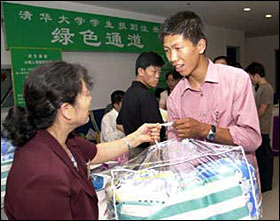
With the new semester beginning in September, more and more students were fortunate to have the opportunity to study at university. With favorable policies in place to help those poor students whose families cannot afford the tuition fees, many freshmen make their way to the reception areas where they can apply for the student loans and financial aid they need. Here they will find information and encouragement but they may also find the media looking for a story.
Most representatives of the media like to cover this aspect at the start of each semester. They mean well, for all they want to do is to report a "human interest story" based on positive news about how the universities are helping their poor students. Moreover, their coverage can serve to encourage poor students in future years thinking of applying for higher education but having reservations about the cost of tuition fees.
So the world has become used to seeing a familiar campus scene. A silent freshman is accompanied by his emotional mother while in the background other poor students are filling in forms for student loans at the reception desk.
But some of these young people turn away from the camera. They do not welcome this particular glare of publicity. The poor students just want to be able to build a better new life for themselves through the opportunities that education can bring.
One official from a university in Beijing said, "In my eyes, the poor students are no different from the other students. I should like to see them provided with the same environment in which to pursue their studies. So I always say no to requests for media visits."
Another experienced teacher expressed his sympathy for the poor or gifted students, "I find it sad that these young people are forced to grow up subjected to the gaze of the public."
There is now a growing public call for the two groups of students to be left in peace so that they can enjoy a healthy educational development, free from intrusive media attention.
In March 1978, the University of Science and Technology of China established a "Special Class for the Gifted Young". The first of its kind in the country, it was a major innovation in higher education in China. Now well known, this special class can speak from years of experience. However, these years have seen tears as well as celebration.
Encouraged by the initial success of the program, a second class was established. Zhu Qingshi, the president of the University of Science and Technology of China, speaks frankly in the light of experience, which has seen more failures than successes, "To some extent, we can attribute the problems to the attentions of the media. Over the past few years, a number of journalists devoted long and detailed articles to the 'Special Class for the Gifted Young'. Interviews were even being conducted in class. Some students could not cope with the pressure of being in the media spotlight and their studies suffered badly. This led to the public beginning to question the validity of this special class."
Now the university is sparing no effort to create a peaceful environment where these young students can study and grow up, free from intrusive external disturbances. The university wishes only the best for these students but it is not an easy wish to fulfill.
Recently the media focused its attention on a so-called "wonder child". Just fourteen-years-old, Wang Dake from northwest China's Gansu Province is the youngest postgraduate student in the history of Peking University. He was interviewed by the media several times in the three months following his acceptance by the Department of Mathematics. In early March this year, reports about this whiz kid spread through the capital's streets and lanes when the preliminary scores for the postgraduate entrance examination were published.
Apart from appealing to the media not to pay too much attention to their youngest student, Peking University has not singled out their new "whiz kid" for special treatment. On the contrary, they are treating him just like any other student on campus. His equality of treatment means there will be no special individual tuition and he will share regular dormitory accommodation with his older classmates. He will study and hand in his assignments just like any other postgraduate students.
Speaking to the media, one of the heads of the Department of Mathematics said, "Without exception, all the students at the university are considered to be outstanding. None should be singled out for special or favorable treatment. Members of staff here are opposed to any artificial obstacles or barriers being placed between this boy and the other students. It is our heartfelt wish that the media should stop focusing their attention on the boy and avoid putting too much pressure on his young shoulders. What he needs most is a normal and peaceful environment in which to study and to go through the process of growing up. We take seriously our responsibility for the future development of the students in our care."
(China Youth Daily, translated by Wang Ruyue for China.org.cn, September 27, 2004)
|

